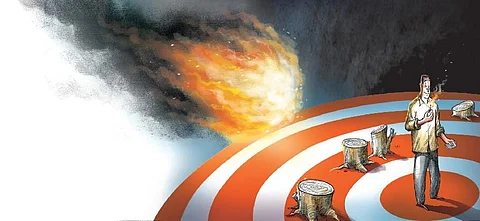

Wildfires are raging; Greece recently faced 600 wildfires in 12 places. People are traumatised and in a state of shock. Canada and California went through a similar experience a few weeks ago. Canada is again preparing for the next wave. Wildfires have affected large parts of Australia and even Siberia. Germany witnessed huge floods a month ago that washed away many houses and properties. The Himalayan glaciers are melting, creating landslides and floods. In the last few years, we have seen a large amount of floods, earthquakes and wildfires all over the world.
Climate change is real. It is widespread, rapid and intensifying. That is the key finding of the latest scientific report from the Intergovernmental Panel on Climate Change. It finds changes in the earth’s climate in every region and across the whole climate system.
Many changes are unprecedented in thousands, if not hundreds of thousands of years. Some, such as the continued rise in sea level, are irreversible over hundreds to thousands of years. The report points to strong and sustained reductions in emissions of carbon dioxide and other greenhouse gases to limit climate change. Benefits for air quality would come quickly, while global temperatures would take 20-30 years to stabilise. The report, issued by the IPCC’s Working Group I and approved by 195 member governments, is the first in a series leading up to the 2022 IPCC Sixth Assessment Report. It includes a closer look at the regional dimensions of climate change and builds on advances in attributing specific weather and climate events to climate change.
We need to realise fossil fuels are formed from the remains of living organisms. Coal is a non-renewable resource; it takes millions of years to develop and there is a limited amount of it. The conditions that would eventually create coal began to develop about 300 million years ago, during the Carboniferous period. However, considering the pace at which we are consuming coal for thermal power, steel, etc., it will be depleted soon.
Similarly, petroleum is a readily combustible fossil fuel that is composed mainly of carbon and hydrogen (thus known as a hydrocarbon). Its formation takes a significant amount of time, having begun to form millions of years ago.
Human beings, in their rush for growth and development, have depleted the reserves of coal and petroleum and used it at enormous speed to create goods and services that benefit the rich, thereby endangering the poor and the planet on which we live.
The question that arises, therefore, is whether we can reduce climate change, if not stop it, by changing our lifestyles and consumption. Clearly the rich and famous who control the world economy will not agree to live with a lesser standard of living. They will most certainly continue to further invent more luxuries, even if it endangers the earth. Elon Musk is not even leaving Mars. The question of sustainability lies in not doing anything that would further endanger the earth and our future.
We are already seeing some green shoots in this direction. The 193 member countries of the UN are thinking about this seriously. Many industries are moving towards sustainable development and making a conscious choice to use renewable energy from the sun and wind. They are planting more trees in and around their manufacturing plants to create an ecological balance. They are embracing inclusive capitalism and building skills, involving the communities living near them to create products and services that they can buy from the community, thereby improving their standard of living.
In India, we have 500-plus districts. If each industry makes it a goal to work towards sustainable development, plant more trees and reduce poverty by providing skill training, education, health and medical facilities, and using clean energy, a lot can be changed.
Another important area is to choose our lifestyle. The roots of the Greco-Roman philosophy lie in the West. Simplifying, much of it preaches that having a lot of pleasure gives a human being satisfaction and peace. The Greek and Roman empires were known for opulence, luxury, slavery, etc. To live well meant having huge palaces, large amounts of jewellery, clothes, many different cuisines, etc. The Eastern philosophy, on the other hand, preached that the realisation of God, renunciation, detachment, austerity, etc., provides real bliss. Both philosophies spread. It appears a larger cross-section of people followed the hedonistic model.
I am not passing any judgement about which model is correct. All I am trying to do is request you to exercise a choice about what to want to have, how much of it you want and whether you want non-degradable plastics and malls that guzzle huge amounts of electricity and create global warming. We need to ask whether there is any necessity to kill two billion animals for consumption and luxury. Can we stop eating dead animals twice a week?
We need to ask, do rich nations need 800 million booster vaccination doses for Covid-19 when 70% of the world has not had even one dose? These are moral questions.
Ashoke K Maitra
Founder and CEO, Sri Ramakrishna International Institute of Management
(ashoke.maitra@gmail.com)